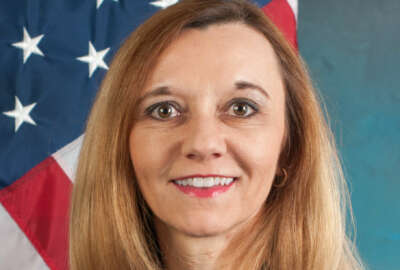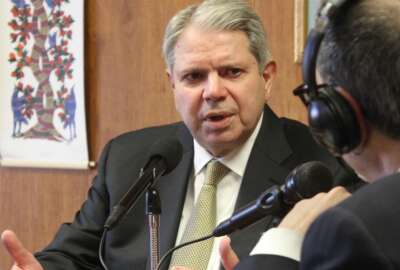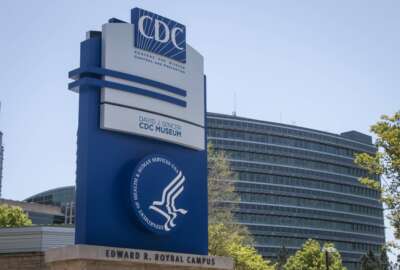
Some new ideas to make the CDC more effective in pandemics
Among the troubling programs on the Government Accountability Office's High-Risk List, is the ability of the Health and Human Services Department to manage the...
Among the troubling programs on the Government Accountability Office’s High Risk List, is the ability of the Health and Human Services Department to manage the national response to health emergencies. In the most recent pandemic, the response of the Centers for Disease Control and Prevention was at best disjointed. That left many other agencies to make their own decisions. Federal Drive with Tom Temin talks about this with Sanjay Patnaik, who says CDC reform should include a way to make CDC expertise available to help other agencies’ responses. Sanjay Patnaik is the Director of the Center on Regulation and Markets at the Brookings Institution.
Interview Transcript:
Tom Temin Now, the outgoing director proposed quite a number of reforms for the CDC to be more agile, to get its information out more quickly. Your idea here, though, is that there is an essential reform that’s needed that is not addressed in this reform plan. Tell us what that is.
Sanjay Patnaik Exactly. So what we have seen during the pandemic is really that an issue like a pandemic is a multidisciplinary problem. It affects a lot of different parts of the government and a lot of different parts of our economy. And so what we are proposing is that the CDC should actually be part of what is called an interdepartmental coordination group that basically includes multiple agencies that could be affected and have decision making power in a pandemic such as HUD and the Department of Defense, for instance. And so an interdepartmental coordination group would bring these different agencies together in order to share expertise, both outwards from the CDC, but also to provide input from other agencies to the CDC’s decision making.
Tom Temin Right. And that really wasn’t the case. You’ve cited a bunch of agencies that made decisions on how to respond to the pandemic completely on their own.
Sanjay Patnaik Exactly. I mean, there was a lot of disjointed efforts within the federal government. And we’ve seen some of the problems that arose because of it. For instance, just to give one example, a developing valid COVID-19 test where the U.S. was far behind many other countries.
Tom Temin Right. And then agencies like the Transportation Department or Housing and Urban Development, you felt made decisions that were just not informed by enough expertise from health professionals or people that had knowledge in these areas.
Sanjay Patnaik Exactly. And the other way around, the CDC itself is a body that is being used to having very long term academic research. And so they also need to know feedback and information from other agencies to actually inform and decision making and be able to more rapidly make decisions.
Tom Temin So is your prescription for change something the CDC would do, or is it something that would have to originate, say, with a bill maybe in Congress to establish this type of inter-departmental committee and then CDC would be a part of it?
Sanjay Patnaik Yeah, that’s a great question. And so one of the templates that we can look to is the U.S. Interagency Council on Homelessness, which coordinates homeless policy among 19 federal agencies, because, again, it’s like a pandemic, it’s a very interdisciplinary problem. And that council was authorized by Congress in the Homeless Assistance Act of 1987. So we would need some kind of provision of some kind of act by Congress to establish a similar interdepartmental coordination group. But it has been quite effective. And it can show that when you try to coordinate this, multiple agencies that often decide in a very insular fashion, you can actually achieve much better results in terms of policy outcomes.
Tom Temin We’re speaking with Sanjay Patnaik. He is director of the Center on Regulation and Markets at Brookings. And you cite a lot of agencies, again, as we’ve said, acting kind of arbitrarily or maybe the best they could with what they knew. But isn’t that also true of CDC? Because the advice kept changing on what to do about masks and what to do about protective gear, this, that and the other to the point where there was pretty much mass confusion, not only among federal agencies but among the public. What’s the root problem there?
Sanjay Patnaik I totally agree. And again, I think going back to my earlier point, one of the root issues is that the CDC is used to doing long form academic research. Right. But not moving very rapidly in real time and then assessing different aspects that are not only scientific. And I think that’s a key here. Right. And we look at the pandemic. Yes. Obviously, the health aspects, the scientific aspects are important, but the pandemic touches on so many issues of our social, economic and political lives that when you make decisions, you have to take these into consideration as well. And that was one of the problem of the CDC’s decision making. They really only focused on the scientific and health aspects, but kind of like did not pay enough attention to the political and economic context the pandemic was happening in and the impacts of the pandemic had on these parts of society.
Tom Temin But is that really CDC’s role?
Sanjay Patnaik It is not CDC’s role, but it is important to make policy decisions by looking at the effects it will have on other parts of the economy. Right? You can make a scientific decision based only on the science and the health, but you have to look at what would be the impact on other parts of society and, for instance, an example is school closures. Right. Like you need to be able to know what is the impact if we closed schools on the well-being of children, on kind of like the economic lives of people. And so in order to do that, it is much better to try to get information both ways from other agencies.
Tom Temin Right. So in some sense, CDC would have to operationalize its research and its scientists to kind of join in a rapid response type of decision making. By the same token, agencies that make the decisions need to inculcate some of the research thinking before they go ahead and make those decisions.
Sanjay Patnaik Exactly. That’s a perfect way to put it. And we do that already in other areas, like I mentioned, the Homelessness Council. But even CDC does that to some degree on bioterrorism, where they coordinate with other agencies.
Tom Temin Right. So it sounds like there’s a little bit of maybe sclerosis in CDC if they are doing this long term research, gathering, these studies and so forth, in a variety of domains. I mean, there’s a lot of diseases out there, but somehow they’ve settled into maybe a more academic mode or a more abstract mode in less of an operational mode, because prevention and control is in their title.
Sanjay Patnaik And I think that’s a very good way to put it, obviously. I mean, look, that pandemic was a once in a hundred years event and it had such a profound effect on all countries are either on two words. So I think it like laid bare some of the shortcomings in government responses that we saw in different parts of the world, but especially those in the United States, and the CDC was part of that.
Tom Temin Is one of the challenges getting the political considerations out of these decisions, because that’s how it seemed to go. People’s opinions of what should be the right thing somehow settled out or sifted out into political camps. And that was part of the problem. Still part of the problem in some ways.
Sanjay Patnaik Yeah, that’s a great point. We didn’t dive too much into it in our report, but trying to make it apolitical is definitely something that is super important. And I think other countries that have been more successful in the initial response, they had less politicized responses and less politicized kind of staff decision making in those health agencies. And I think that’s very important in a pandemic, right? I mean, we don’t want that to be politicized. We want that to be driven by the best science. But with taking into consideration all the different angles that we need to look at, like the economic implications, the political and social implications.
Tom Temin Yeah, I guess that’s what they call common sense, because when you see one of these headlines that says experts say blah, blah, blah, my initial reaction is how did the world ever get along without experts? So there’s some point needed to marshal the expertise in a way that it informs what is ultimately common sense.
Sanjay Patnaik You need to channel expertise in ways when you try to implement them in a practical way. And I think there’s a saying, right, like it’s all about execution and about implementation and the pandemic has shown that is really the case.
Tom Temin Do you think the CDC would benefit from longer term leadership? I mean, in agencies that have trouble responding or have other systemic issues, you often find that there is a just a turnover continually of leadership because they’re politically appointed, they’re high pressure jobs, the press gets after you and so on. So people leave after two or three years, as is the case for Dr. Walensky and her predecessors. Is that an issue? And should something like CDC, which, as you mentioned, is basically a research oriented organization, should it have a term director?
Sanjay Patnaik I think that could be really beneficial. And I think if we look at other places in the world, for instance, the European Union, that is what is kind of like the model for a lot of their decision making. It’s more bureaucratized to not have a lot of these political appointees. And I think that turnover can cause issues for the staff below, right, Because you have sometimes very different decision making coming in because of these political appointees and in agencies like the CDC that are really focused on trying to rein in a pandemic, trying to solve these problems, long term decision making would be definitely better.
Tom Temin Then the question becomes balancing that bureaucratization with accountability with someone that’s there a long time.
Sanjay Patnaik For sure. And there need to be mechanisms for that.
Copyright © 2025 Federal News Network. All rights reserved. This website is not intended for users located within the European Economic Area.
Tom Temin is host of the Federal Drive and has been providing insight on federal technology and management issues for more than 30 years.
Follow @tteminWFED





